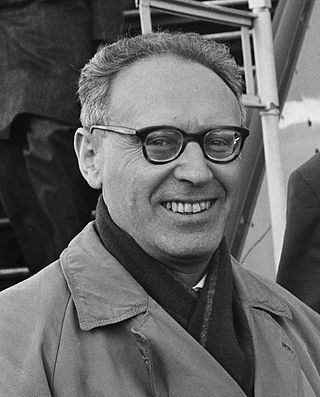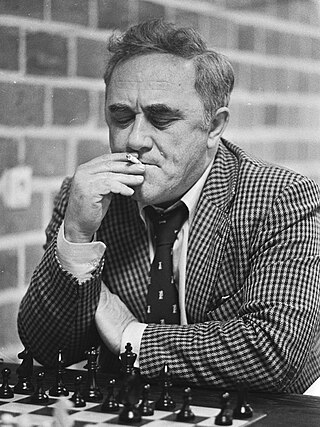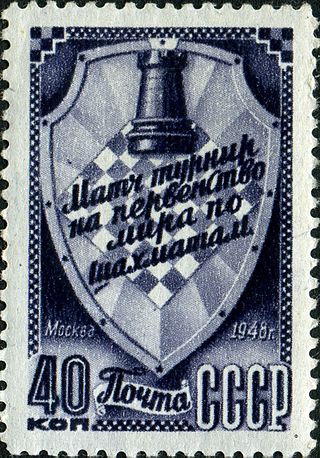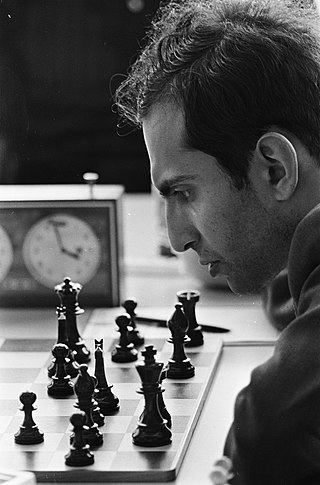
Mikhail Nekhemyevich Tal was a Soviet-Latvian chess player and the eighth World Chess Champion. He is considered a creative genius and is widely regarded as one of the most influential chess players. Tal played in an attacking and daring combinatorial style. His play was known above all for improvisation and unpredictability. Vladislav Zubok said of him, "Every game for him was as inimitable and invaluable as a poem".

David Ionovich Bronstein was a Soviet chess player. Awarded the title of International Grandmaster by FIDE in 1950, he narrowly missed becoming World Chess Champion in 1951. Bronstein was one of the world's strongest players from the mid-1940s into the mid-1970s, and was described by his peers as a creative genius and master of tactics. He was also a renowned chess writer; his book Zurich International Chess Tournament 1953 is widely considered one of the greatest chess books ever written.

Mikhail Moiseyevich Botvinnik was a Soviet and Russian chess grandmaster who held five world titles in three different reigns. The sixth World Chess Champion, he also worked as an electrical engineer and computer scientist and was a pioneer in computer chess. He also had a mathematics degree (honorary).

Vasily Vasilyevich Smyslov was a Soviet and Russian chess grandmaster, who was World Chess Champion from 1957 to 1958. He was a Candidate for the World Chess Championship on eight occasions. Smyslov twice tied for first place at the USSR Chess Championships, and his total of 17 Chess Olympiad medals won is an all-time record. In five European Team Championships, Smyslov won ten gold medals.

The USSR Chess Championship was played from 1921 to 1991. Organized by the USSR Chess Federation, it was the strongest national chess championship ever held, with eight world chess champions and four world championship finalists among its winners. It was held as a round-robin tournament with the exception of the 35th and 58th championships, which were of the Swiss system.

Paul Keres was an Estonian chess grandmaster and chess writer. He was among the world's top players from the mid-1930s to the mid-1960s, and narrowly missed a chance at a World Chess Championship match on five occasions. As Estonia was repeatedly invaded and occupied during World War II, Keres was forced by the circumstances to represent the former Soviet Union and Nazi Germany (1941–44) in international tournaments.

Alexander Alexandrovich Kotov was a Soviet chess grandmaster and author. He was a Soviet chess champion, a two-time world title Candidate, and a prolific writer on the subject of chess. Kotov served in high posts in the Soviet Chess Federation, and wrote most of his books during the Cold War. The importance and breadth of Kotov's work rank him among the all-time greats in this field.

Efim Petrovich Geller was a Soviet chess player and world-class grandmaster at his peak. He won the Soviet Championship twice and was a Candidate for the World Championship on six occasions. He won four Ukrainian SSR Championship titles and shared first in the 1991 World Seniors' Championship, winning the title outright in 1992. His wife Oksana was a ballet dancer while his son Alexander was also a chess master. Geller was coach to World Champions Boris Spassky and Anatoly Karpov. He was also an author.

Igor Zakharovich Bondarevsky was a Soviet Russian chess player, trainer, and chess author. He held the title of Grandmaster in both over-the-board and correspondence chess. Bondarevsky shared the 1940 Soviet title, and later coached World Champion Boris Spassky.

Fedir Parfenovych Bohatyrchuk was a Ukrainian-Canadian chess player, doctor of medicine (radiologist), political activist, and writer.

Alexander Markovich Konstantinopolsky was a Soviet chess player, trainer and writer. He was a five-time champion of Kiev, and trained the world title challenger David Bronstein from a young age. He was awarded the title of International Master (IM) by FIDE in 1950, won the first Soviet Correspondence Chess Championship in 1951, earned the IM title at correspondence in 1966, and earned the title of Honorary Grandmaster in 1983.

Boris Markovich Verlinsky was a Soviet chess player, who was awarded the title International Master by FIDE, the world chess federation, in 1950. He was one of the top Soviet players in the 1920s, and was Soviet champion in 1929.

Ilya Leontievich Rabinovich was a Russian and later Soviet chess player, among the best in his country for three decades, from 1910 to 1940. His best result was a shared first place in the 9th Soviet Championship of 1934-35. He was also a chess writer.

The 1948 World Chess Championship was a quintuple round-robin tournament played to determine the new World Chess Champion following the death of the previous champion Alexander Alekhine in 1946. The tournament marked the passing of control of the championship title to FIDE, the International Chess Federation which had been formed in 1924. Mikhail Botvinnik won the five-player championship tournament, beginning the era of Soviet domination of international chess that would last over twenty years without interruption.

At the World Chess Championship 1963, Tigran Petrosian narrowly qualified to challenge Mikhail Botvinnik for the World Chess Championship, and then won the match to become the ninth World Chess Champion. The cycle is particularly remembered for the controversy surrounding the Candidates' Tournament at Curaçao in 1962, which resulted in FIDE changing the format of the Candidates Tournament to a series of knockout matches.
Vladimir Alexeyevich Alatortsev was a Soviet chess player, author, and administrator. During his career, he became champion of both Leningrad and Moscow, and played in the Soviet Chess Championship finals nine times, with his best competitive results in the 1930s. He placed clear second in the 1933 Soviet final. He retired from most competitive play in the early 1950s, moving into roles as a chess organizer, teacher, and coach. He served as chairman of the All-Union chess section from 1954 to 1959 and as chairman of the USSR Chess Federation from 1959 to 1961. By profession, he was a hydraulics engineer.

Groningen 1946 was the first major international chess tournament to be held after World War II. Held at Groningen in August and September 1946, it was considered a miracle that the Netherlands could stage such an event just fifteen months after the end of the war.

A World Chess Championship was played between Mikhail Botvinnik and Vasily Smyslov in Moscow from March 16 to May 13, 1954. Botvinnik had been World Champion since 1948 and had successfully defended the title in 1951, while Smyslov earned the right to challenge by winning the 1953 Candidates tournament.

The 1940 Soviet Chess Championship was the 12th edition of USSR Chess Championship. Held from 5 September to 3 October 1940 in Moscow. The tournament was won by Andor Lilienthal and Igor Bondarevsky. Twenty of the Soviet Union's strongest masters competed in the final, six of whom qualified in the semifinals in Kiev earlier that year: Eduard Gerstenfeld, Mark Stolberg, Igor Bondarevsky, Iosif Rudakovsky, Alexander Konstantinopolsky and Peter Dubinin. The remaining invitations went to the Soviet chess elite. Botvinnik did his worst championship, only drawing in 5th/6th position, losing matches to both winners. This championship marked the debut of Paul Keres (4th) and the future world champion Vassily Smyslov (3rd). USSR had expanded its territory in 1939-40, incorporating the Baltic states, which meant that the strong masters Paul Keres from Estonia and Vladimir Petrov from Latvia were able to participate. In 1941, the top six played a competition called Absolute Championship of Soviet Union, ending with Botvinnik's victory.

The 1957 Soviet Chess Championship was the 24th edition of USSR Chess Championship. Held from 20 January to 22 February 1957 in Moscow. The tournament was won by Mikhail Tal. The final were preceded by quarterfinals events at Frunze, Tallinn, Yerevan ; semifinals at Leningrad, Kharkov and Tbilisi.



















